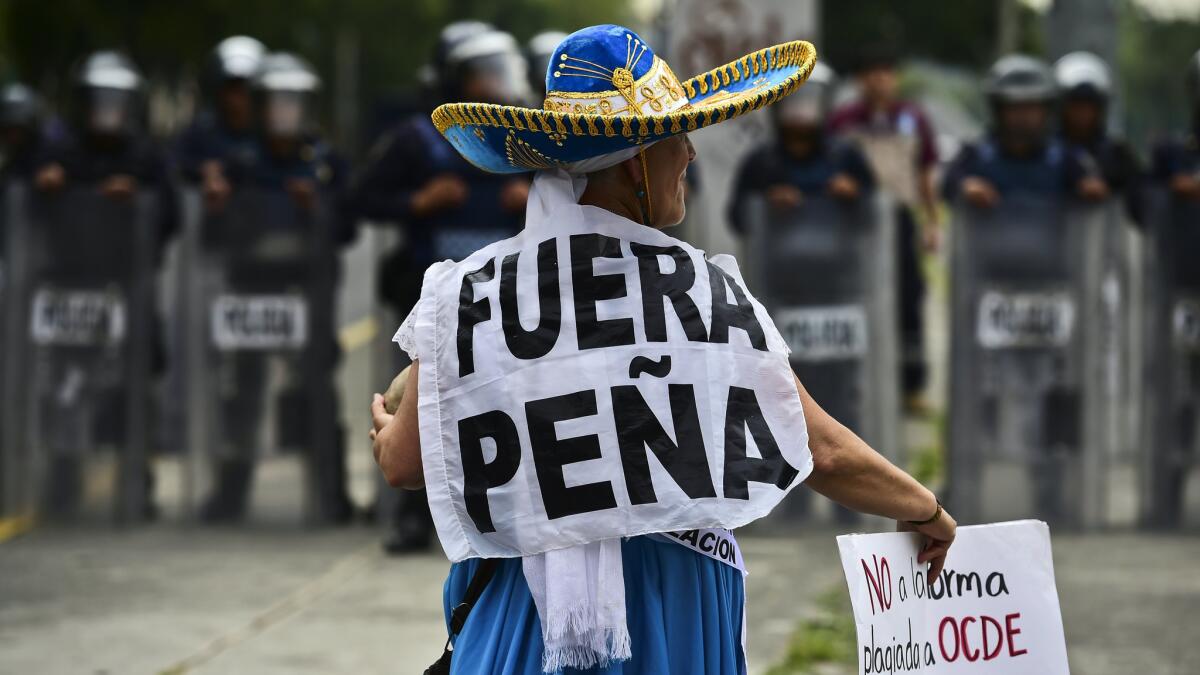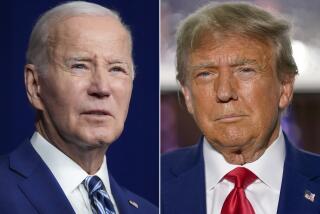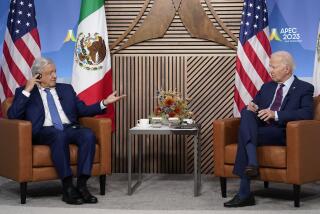Even before Trump’s visit, Peña Nieto was Mexico’s least popular president ever. Too late to change that?
If Mexican President Enrique Peña Nieto was taking a gamble when he invited Donald Trump to meet with him this week, it was because he didn’t have much to lose.
More than halfway through his six-year term, Peña Nieto is Mexico’s least popular president since pollsters began such surveys in the 1990s.
In recent months, he has struggled to address rising homicide rates, a slowing economy and corruption scandals involving three of his party’s governors.
He has made enemies with teachers over his recent educational reforms, and with the Catholic Church for supporting nationwide same-sex marriage. He’s even been accused of plagiarizing much of his law school thesis.
And that was all before Trump came to town.
Exactly why Peña Nieto, 50, invited Trump to a closed-door meeting at his presidential palace remains a mystery to many Mexicans, who loathe the Republican presidential candidate for branding Mexican immigrants as rapists and saying he’d make Mexico pay for an impenetrable wall on its northern border.
What is clear is that by the time Trump had departed Wednesday afternoon and the pair had begun a Twitter war over whether they had discussed who would pay for the wall, the verdict on how the meeting played out for Peña Nieto was clear.
“It was a disaster,” said security analyst Alejandro Hope. “He paid a huge political cost for no political gain.”
“It was like it couldn’t get any worse for him, and yet he made it worse,” said Maureen Meyer, a Mexico expert at the Washington Office for Latin America, a human rights advocacy group.
It was like it couldn’t get any worse for him, and yet he made it worse.
— Maureen Meyer, Washington Office for Latin America
On Friday, fliers started circulating on social media, calling for a march in two weeks to demand the president step down.
A survey published by Reforma newspaper underscored the point, with 85% of those polled calling Peña Nieto’s meeting with Trump a mistake. Nearly two-thirds said the incident made their opinion of the president go down.
Not that Peña Nieto’s poll numbers had much room to fall. A Reforma survey from last month showed only about 23% of Mexicans held a favorable opinion of the president. He is now regarded more poorly than former President Ernesto Zedillo was at the height of the mid-1990s economic crisis.
“The mockery of him around the world is well-deserved,” said Carlos Sortre, a 38-year-old restaurant manager in Mexico City. “Never in my life have I felt so much frustration with a president, so much anger.”
And yet his term had started with so much promise. Peña Nieto’s 2012 election returned his Institutional Revolutionary Party, or PRI, to power after a 12-year absence. He vowed to be a new kind of leader of the PRI, which had previously ruled autocratically for seven decades, its name practically synonymous with corruption.
Although Peña Nieto won with just 38% of the votes in an election with two other major candidates, many Mexicans had high hopes for the young, charismatic and handsome politician whose telenovela star wife, Angelica Rivera, they had followed in the tabloids. Peña Nieto enjoyed a 61% favorability rating when he entered office.
He moved quickly to enact a series of bold structural reforms across several key sectors, with mixed results.

While Mexico has won international praise for modernizing its judicial system in recent years, a series of energy reforms have so far been less successful, in part because Peña Nieto opened up the nation’s state-owned oil company to the private sector shortly before oil prices plummeted to their lowest levels in years.
“The strategic mistake the president made was to oversell his reforms,” said Tony Payan, director of the Mexico Center at Rice University’s Baker Institute. “They were premised on false promises of a quick payoff. People expected to see reduced prices in gasoline and electricity, and they have not seen that. What they see is the opposite.”
“The government says the economy is fine, but our families don’t feel that,” said Laura Carmona, 45, a mother of four who works at an auto dealership. “The prices go up all the time — light, gasoline, rent — but our wages do not rise.”
The president’s attempts to overhaul the education system have been similarly fraught, with teachers protesting new requirements for teacher evaluation exams by setting up roadblocks and refusing to enter the classroom in some parts of the country. In June, several people were killed in the southern state of Oaxaca after police clashed with demonstrators.
Security continues to be a problem. After subsiding early in Peña Nieto’s term, homicides are on the rise. Local and federal police tasked with fighting drug cartels have been plagued by accusations of torture and other human rights violations. This year, independent investigators discredited a government account of what happened to 43 students who vanished after being apprehended by state police in the state of Guerrero.
Peña Nieto has also been dogged by personal corruption scandals, including questions over his wife’s 2014 purchase of a white marble mansion from a government contractor and more recent plagiarism allegations (the president said he didn’t lift anything in his law school thesis but acknowledged “methodological errors”).
His party fared badly in regional elections this summer, thanks in part to the fact that three PRI governors on their way out because of term limits are facing corruption allegations, included charges of graft.
Political analyst José Antonio Crespo said Peña Nieto needs to address corruption head-on if he wants to save his presidency and his party’s chances at holding onto power in the 2018 race to replace him.
“He needs to fight corruption as much as possible,” Crespo said. “This was the message of the elections.”
But that is a difficult move for Peña Nieto, who would be attacking his own party if he pressed for more investigations into the actions of the governors. The president hasn’t yet named a special prosecutor to head a new anti-corruption system that his government created under pressure from advocacy groups. Some analysts say he appears more interested in trying to improve his reputation in front of television cameras.
“I think in some ways the administration is convinced that they just have an image problem,” said Payan. “I wonder if the president views it simply as a matter of correcting his message.”
That could explain why Peña Nieto decided to host Trump for a high-profile meeting.
“I believe in dialogue to promote the interests of Mexico in the world, and to protect Mexicans wherever they are,” Peña Nieto wrote on Twitter before the meeting.
But many Mexicans considered the meeting an insult and an act of hubris on Peña Nieto’s part.
See more of our top stories on Facebook »
“If Peña Nieto isn’t capable of security, of generating jobs or generating wealth, he isn’t capable of defending Mexicans in the U.S.,” said Jose Cruz, 26, a Mexico City resident who has spent the last six months looking for a job after graduating with an engineering degree.
“It’s not Trump who should apologize to Mexicans, it’s Peña Nieto for having created this nonsense,” he said.
On Wednesday Peña Nieto stood side-by-side with Trump after their meeting and called the exchange “open and productive.”
Just hours later, Trump delivered an incendiary immigration speech in Phoenix and repeated his vow to make Mexico pay for construction of a border wall. Peña Nieto responded with a terse message on Twitter: “I repeat what I told you personally, Mr. Trump: Mexico will never pay for a wall.” By Thursday he called Trump’s ideas “a threat to the future of Mexico.”
Enrique Ochoa, the president of the PRI, defended Peña Nieto’s meeting with Trump. “It was an opportunity for Mexico to tell the candidates what offends us, to demand respect for Mexicans living in the United States, and to say up front that we reject the construction of a wall and of course refuse to pay a penny for its construction,” Ochoa said.
The Trump issue came up several times as Peña Nieto gave his annual address to the nation Thursday night. Breaking with past formats, the president announced weeks ago that he would field questions from young people in a televised town-hall-style meeting, instead of giving a speech.
One young man asked about the president’s poor poll numbers and what he will do to raise the government’s credibility.
“Sometimes you have to make decisions that aren’t popular,” Peña Nieto said. “I did not become president to maintain high popularity ratings. I decided to become president because I wanted to transform Mexico.”
Twitter: @katelinthicum
Cecilia Sanchez in the Times Mexico City bureau contributed to this report.
ALSO
Mexican president calls Trump’s ideas ‘a threat to the future of Mexico’
Trump’s Mexico visit stirs outrage: ‘We don’t want him’
More to Read
Start your day right
Sign up for Essential California for news, features and recommendations from the L.A. Times and beyond in your inbox six days a week.
You may occasionally receive promotional content from the Los Angeles Times.







